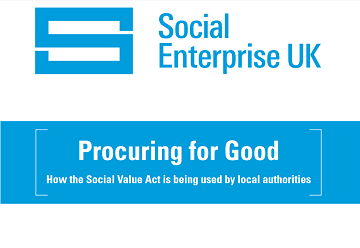One in three councils now consider social value in commissioning, says new report

Procuring for Good – a new report published by Social Enterprise UK paints the most comprehensive picture yet about how councils in England are using the Public Services (Social Value) Act.
Findings from Freedom of Information requests [1] sent to all local authorities in England show that more councils than ever are considering social value when commissioning services: 1 in 3 (33%) now routinely consider social value in their procurement and commissioning, and 1 in 4 (24%) have a social value policy.
But according to Procuring for Good, the barriers to greater adoption will only be overcome by legislative change to strengthen the Act.
The report categorises local authorities into four categories – embracers, adopters, compliers and bystanders – dependent on the existence of a social value policy, the scope of contracts to which they apply social value, and how social value is implemented.
The findings reveals that 1 in 7 (14%) councils are fully embracing social value, applying it frequently to contracts including those below the threshold (of €209,000) for services [2] – and the majority of these councils have a social value policy (58%). A further 1 in 5 (19%) councils are ‘adopters’ of the Act, applying it conservatively, but have a social value policy, framework or toolkit.
Almost half (45%) of the councils that responded ‘comply’ with the Social Value Act – they mention social value in their procurement strategy but apply it infrequently, while 1 in 5 (22%) councils are ‘bystanders’ – these operate without a social value policy and have little or no mention of social value in their procurement policy.
Smaller District Councils less likely to consider social value than larger councils
The findings show that a third (32%) of District Councils fall into the ‘bystander’ category, meaning they are making little or no use of the Act. Since many District Councils are small and rarely tender for services above the Official Journal of the European Union (OJEU) threshold of €209,000 [2], they have not integrated social value into their commissioning and procurement procedures. This is despite guidance from the Department for Communities and Local Government (DCLG) which encourages them to do so [3].
According to Procuring for Good, medium and larger local authorities, which much more frequently tender for services, are significantly more likely to have a social value policy and to use it to address local priorities.
Scoring for social value in tenders
Research for the report found that there are two ways in which councils score social value when putting contracts out to tender. Some include social value clauses and terms; others include weighting for social value. The ‘complier’ councils (45% of those surveyed) give social value a 5% or less weighting; ‘adopters’ (19% of those surveyed) between 5-10% of the overall score; while ‘embracer’ councils (14% of those surveyed) score social value as high as 30%.
Peter Holbrook, Chief Executive of Social Enterprise UK said:
“This research shows that where the will exists, councils in England are using the Act to embed social value into the way they commission services – in many cases going beyond its obligations to create positive change in their communities. This is a credit to the procurement and commissioning teams driving this agenda, they are unsung heroes.
“Sadly too many councils still see the Act as a duty rather than an opportunity. The Act has been in force for more than three years but is not empowering local authorities in the way it could be, to the detriment of our communities. Legislative change is needed – the Act lacks teeth and simply asking public sector bodies to consider the creation of social value when commissioning services is not enough.”
Chris White MP, who tabled the Public Services (Social Value) Act, said:
“Thanks to this research, we have for the first time a clear picture of how embedded social value is within local government. Despite substantial progress, there is still a way to go before all councils are making full use of the changes to commissioning that the Act makes possible.”
Case studies
Manchester City Council – A large urban centre embracing social value
Labour-run Manchester City Council, a Metropolitan Borough Council, has adopted both a Sustainable Procurement Policy and the Greater Manchester Social Value Policy. It applies social value across all contracts. Initially social value was given a minimum of 10% of the overall normalised weighting when scoring tenders, but was increased in November 2015 to a minimum of 20% of the overall 100% normalised weighting.
Bristol City Council – A unitary authority embracing social value
The Council has adopted a social value policy and toolkit. Social value is considered in relation to all of its commissioning and procurement activity. Where possible to identify in the commissioning process that additional social value outcomes are relevant and appropriate to specific contracts, 10% of the quality element of the price/quality ratio is allocated to social value. The council’s social value was developed under the previous independent Mayor, demonstrating the social value goes beyond party politics.